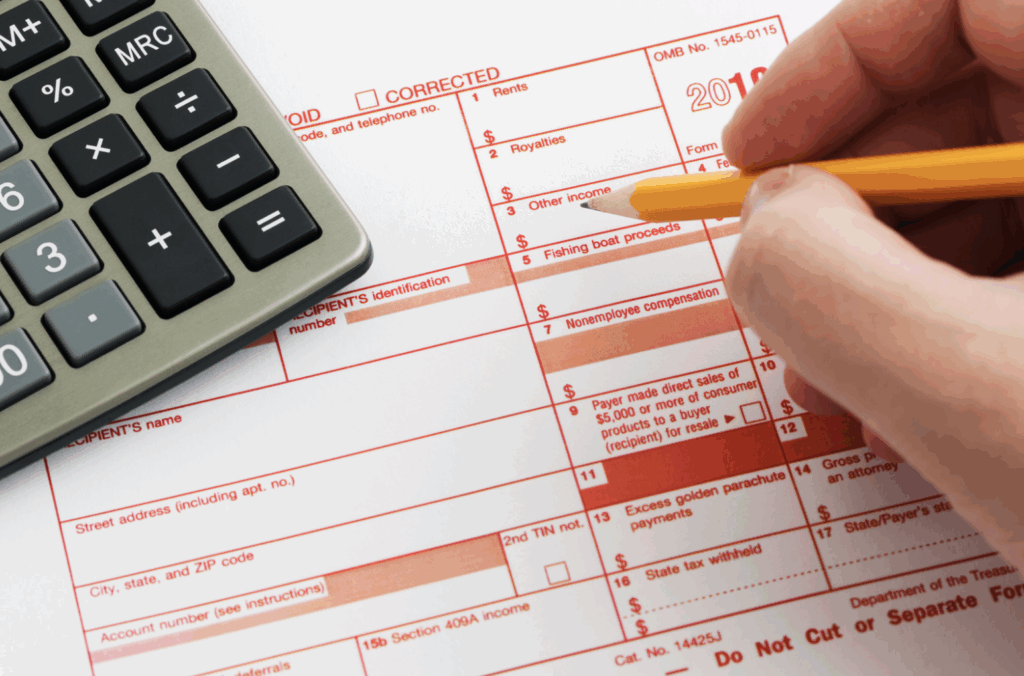Did you know that debt cancellation is considered taxable income? If you had some or all of your debt forgiven by a creditor, you may receive a Form 1099-C. This is an important document that helps you report your cancelled debt on your taxes.
Understanding 1099-C Debt Cancellation Form
If you received a 1099-C in the mail from a creditor, it’s probably because you were granted forgiveness or cancellation of personal loan debt, credit card debt, student loan debt, or any type of consumer debt. Whenever a credit card company or lender forgives $600 or more, it is required by law to file the cancellation of debt notice with the Internal Revenue Service (IRS), which sends the 1099-C to the original borrower who must use it to report cancellation of debt income on their tax return.
Information in 1099-C Form
Here’s what information is typically included in a 1099-C form:
- Creditor’s Information: Name, address, and taxpayer identification number (TIN) of the creditor who canceled the debt.
- Debtor’s Information: Name, address, and taxpayer identification number (typically the borrower’s Social Security Number).
- Account Number: Identifies the account or loan associated with the canceled debt.
- Date of Debt Cancellation: The exact date the debt was canceled.
- Amount of Debt Canceled: The total amount of the debt that was forgiven or canceled.
- Description of the Debt: A brief description of the debt, such as “credit card debt” or “personal loan.”
- Fair Market Value of Property: If applicable, the fair market value of any property involved in the cancellation (e.g., foreclosure or repossession situations).
- Reason for Debt Cancellation: Codes are used to indicate why the debt was canceled (e.g., bankruptcy, agreement, or similar situations).
- Interest: If a portion of the canceled debt includes interest, this is reported separately.
Who files a 1099-C?
A 1099-C is filed by creditors or lenders when they cancel or forgive a debt of $600 or more owed by a borrower. These creditors are required to file the form with the IRS and provide a copy to the borrower as well. Entities that commonly file a 1099-C include:
- Financial institutions: Lenders such as banks, credit unions, and other financial institutions typically file a 1099-C when they cancel debts related to loans, credit card balances, mortgages, and other types of personal or business loans.
- Credit card companies: When a credit card company forgives an unpaid balance, they are required to file a 1099-C.
- Collection agencies: If a collection agency cancels a debt that it has been trying to collect, they also must file this form.
- Federal government agencies: The government (the IRS, SBA, or other federal agencies) may file a 1099-C if it forgives or cancels a debt owed by a taxpayer.
- Lenders in foreclosure or repossession situations: In cases of foreclosure or repossession where the lender forgives a portion of a mortgage or loan balance, the lender is required to file a 1099-C.
Implications of Receiving a 1099-C
Receiving a 1099-C form has significant tax implications, as canceled debt is generally considered taxable income by the IRS. This means that the forgiven amount must be reported on your tax return, potentially increasing your taxable income and overall tax liability.
However, there are exceptions, such as debts discharged in bankruptcy, insolvency, or through certain student loan forgiveness programs, which may not be taxable.
While receiving a 1099-C reflects debt forgiveness, the canceled debt may still appear on your credit report, impacting your credit score. It’s important to be aware of state tax implications as well, since some states may also tax forgiven debt.
Because the IRS receives a copy of the 1099-C, failing to report the income could lead to audits and penalties. Consulting a tax professional is advisable to ensure compliance and take advantage of any exclusions that might reduce your tax burden.
Detecting Issuance of 1099-C
To know if you received a 1099-C, you can take the following steps:
- Check Your Mail: Creditors or lenders are required to send a copy of the 1099-C form to you by January 31st of the year following the debt cancellation. The form will arrive via mail, so check your mailbox for any official correspondence from creditors, lenders, or financial institutions.
- Review Your Email: Some creditors may send notifications or forms electronically. If you’ve opted for electronic delivery of tax forms, check your email or your creditor’s online portal for the document.
- Contact Your Lender or Creditor: If you had a debt canceled, forgiven, or settled for less than what you owed, contact the creditor or lender directly to confirm if they filed a 1099-C with the IRS. They are required to notify you if the debt cancellation exceeds $600.
- Check Your IRS Transcript: You can request a tax transcript from the IRS, which will show any 1099-C forms filed under your Social Security number. The IRS receives a copy of any 1099-C forms issued by creditors, so this can help verify if one was filed.
- Check Your Online Tax Filing Software: If you use online tax software, the system may pull in available forms filed with the IRS. This could alert you to any 1099-C associated with your Social Security number.
Being proactive in checking for a 1099-C is important because it can impact your tax return and result in penalties if unreported.
Exceptions to the Debt Cancellation Rule
There are several exceptions to the rule that canceled debt is considered taxable income. If any of these exceptions apply, the forgiven debt may not need to be reported as income on your tax return. Here are some of the common exceptions to the debt cancellation rule:
Bankruptcy
If your debt was discharged through a Chapter 7, Chapter 11, or Chapter 13 bankruptcy, the canceled debt is not considered taxable income. This is one of the most common exclusions.
Insolvency
If you were insolvent at the time the debt was canceled (meaning your total liabilities exceeded the value of your assets), you may be able to exclude some or all of the forgiven debt from taxable income. You must calculate your insolvency by comparing your debts and assets just before the debt was canceled.
Qualified Principal Residence Indebtedness (Mortgage Forgiveness):
Mortgage debt forgiven in connection with a foreclosure or short sale on your principal residence may be excluded from taxable income. This is applicable to certain situations, but the exclusion is subject to limitations.
Certain Student Loan Forgiveness Programs
If your student loans were forgiven as part of a public service program, such as through the Public Service Loan Forgiveness (PSLF) program, the canceled debt may not be considered taxable income. Certain student loans that are forgiven after 2021 under the American Rescue Plan Act (for loans canceled between 2021 and 2025) are also excluded from taxable income.
Disaster Relief Situations
In some cases, debt forgiveness related to federally declared disaster areas may not be considered taxable income.
Each of these exceptions has specific criteria, and in some cases, you may need to file additional IRS forms (such as Form 982) to claim the exclusion. Consulting a tax professional is recommended to ensure you meet the requirements for any of these exceptions and to avoid reporting taxable income unnecessarily.





